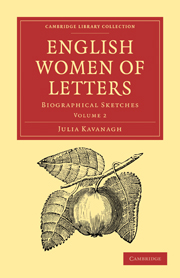Summary
There is no writer, howsoever gifted, with whom talent, or even genius, is not partly natural and partly acquired. This culture or development of a noble gift varies infinitely. Sometimes it is dependent on individuals, sometimes on circumstances, on the inanimate, though ever living, aspects of nature. We know what combination of education, scenery, and early passion, blending with original genius, gave us Byron. We can conjecture, but what would we not give to know, how Shakespeare was moulded in that strangely intellectual form which is greater even than his genius, and leaves us, above all, the impression of a mighty mind. The merits and errors of Madame de Staël were bred with her. Her genius was, as it always is, her own, but her whole turn of thought was influenced from her childhood. Thus, too, Miss Edgeworth's “manly understanding,” as a critic once justly said, owed much, not merely to the training of her youth, but to events and generations that preceded her birth. To her father she was especially indebted. He was a remarkable man, and a great educator; he was always full of mechanical and social projects, a reformer and an inventor. We doubt whether his direct influence improved his celebrated daughter; we think we can trace many of her faults to Richard Lovell Edgeworth; but to his indirect action, to early and constant intercourse with his vigorous and active mind, she certainly owed much of that strength, judgment, and wisdom which are her great and remarkable attributes.
- Type
- Chapter
- Information
- English Women of LettersBiographical Sketches, pp. 86 - 114Publisher: Cambridge University PressPrint publication year: 2010First published in: 1863

